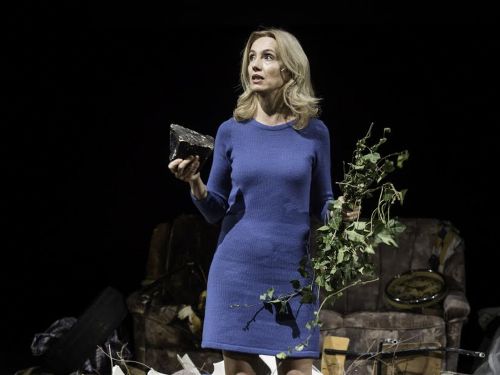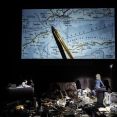Schaubühne Berlin Theatre (Germany)
directed by Milo Rau
Last summer the fate of the refugees shocked all of Europe and countless intellectuals and politicians expressed their solidarity to the peoples of the Middle East and Africa who are suffering. Pictures of people who had drowned washed up on the beaches of the Mediterranean or victims of civil war and disease in Central Africa, the financial crisis and catastrophes in our age are ever present on Facebook, television and in the Press.
In the piece 'Compassion. The History of the Machine Gun', Milo Rau – perhaps one of the biggest names in Europe at the moment as far as directing is concerned – and the renowned Schaubühne Berlin Theatre – the largest subsidised German theatre – take us on a journey to the political hot spots of our times. The Mediterranean routes taken by refugees from the Middle East and the civil war zones of Congo.
This documentary – performance has the form of a double monologue. The director has actress Ursina Lardi (who is from Switzerland) show photographs on a large screen – including the picture of 3-year-old Aylan Kurdi – on her way back from a mission to Turkey and Greece. Lardi's speech interchanges with narration by her colleague Consolate Sipérius (of African descent), whose family were the victims of genocide in 1990, as revealed to us by Rau. It should be noted that the texts are based on real interviews conducted with members of NGOs, clerics and war victims in Africa and Europe.
This performance intentionally explores conflicting issues: How can we stand the misery of others and why do we watch it? How can one dead person at the gates of Europe overshadow the thousands of dead in the civil war zones of Congo? 'Compassion. The History of the Machine Gun' treads on the limits of compassion and European humanism. Rau turns his attention to the refugee crisis and its real causes, civil conflict in Africa and, lastly, to western societies themselves, which, having been built on imperialist ferocity and economic interest, also carry some of the blame.
Milo Rau (1977, Bern) has been working as an independent director and writer since 2003, while in 2007 he founded the imaginatively named 'International Institute of Political Murder' (IIPM) theatre and film production company. His CV also lists studies in Sociology, expressed repeatedly in his work, which indicates a special interest in sociopolitical subjects, on borders, immigration, discrimination and racism. In fact, as a journalist he has covered the war in Rwanda, genocides in Africa and ethnic cleansing, but he did not stop there. Rau puts it all up on stage, in an effort of his own to shine the light on the truth.
As far as Schaubühne Berlin Theatre is concerned, it was founded in 1962. Thomas Ostermeier has been its artistic director since 1999, during whose tenure a team of permanently employed actors has been created, who have all worked together ever since. It should be noted that the theatre has at leasts 10 premiers every season, with an interchanging repertoire of 30 productions, which makes it one of the most productive and creative teams in all of Europe.
Greek supertitles
Performance contributors
Director: Milo Rau
Set and costume designer: Anton Lukas
Video and sound: Marc Stephan
Dramaturgy: Florian Borchmeyer
Research/Dramaturgy collaboration: Mirjam Knapp, Stefan Bläske
Lighting design: Erich Schneider
Actors: Ursina Lardi, Consolate Sipérius
Co-organised with Goethe Institute of Thessaloniki





















































































